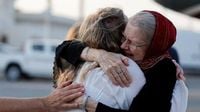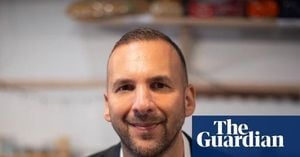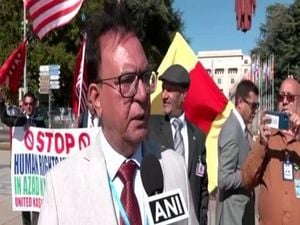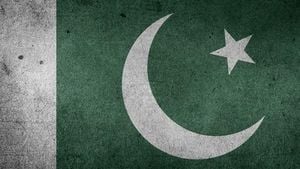After nearly eight months in Taliban detention, British couple Peter Reynolds, 80, and his wife Barbie, 76, have finally been released and reunited with their family, marking the end of an ordeal that drew international concern and diplomatic intervention. Their release on Friday, September 19, 2025, comes after protracted negotiations led by Qatar, with both the British government and the couple’s family working tirelessly behind the scenes.
The Reynolds’ story is one of deep roots in Afghanistan. The couple, who married in Kabul in 1970, have spent almost two decades living in the country, running educational programs for women and children in Bamiyan province. They even became Afghan citizens, a testament to their commitment to the local community. Despite the Taliban’s return to power in 2021—a seismic shift that followed the U.S. military withdrawal—the Reynolds chose to remain, defying British embassy advice to leave.
Their detention began in February 2025, as they returned to their home in Bamiyan. The Taliban authorities arrested the couple on undisclosed charges, never publicly explaining the reasons behind their actions. According to CBS News, the Taliban claimed the couple had broken Afghan laws, but offered no details. The couple’s family, meanwhile, accused the Taliban of mistreatment and repeatedly called for their release, citing their deteriorating health and lack of due process.
During their captivity, the Reynolds were largely held separately, at first in a maximum security facility, then in underground cells without daylight, according to United Nations human rights experts. Later, they were transferred to the intelligence services in Kabul. The Qatari embassy in Kabul played a crucial role, providing the couple with access to medical care, delivery of medication, and regular communication with their family. "God is good, as they say in Afghanistan," Barbie Reynolds told reporters at Kabul airport, expressing her gratitude for the support they received.
Their release was not only a relief for their family but also a testament to the power of international diplomacy. Qatar, an energy-rich nation with a history of mediating between the Taliban and the West, spearheaded the negotiations. The British government, for its part, worked intensively throughout the couple’s detention, offering support to the Reynolds’ family and collaborating closely with Qatari officials. Hamish Falconer, the U.K.’s Minister for the Middle East, Afghanistan, and Pakistan, expressed his relief: "I look forward to them being reunited with their family soon." He also thanked Qatar for its "essential role in this case."
Upon their arrival in Doha, the couple was greeted by emotional family members, including their daughter Sarah Entwistle. "Thank you for giving us our family back," she told reporters, visibly moved. "This experience has reminded us of the power of diplomacy, empathy and international cooperation." Their son, Jonathan Reynolds, echoed these sentiments in an interview with Sky News, noting that their parents’ health would have deteriorated further had they been held any longer, despite Qatar’s efforts to ensure they had access to doctors and medicines.
The United Nations had sounded the alarm earlier in the summer. In July 2025, independent UN human rights experts publicly warned that the Reynolds’ physical and mental health was deteriorating rapidly and that they faced "irreparable harm or even death" if their detention continued. The family’s repeated pleas for their release were finally answered, but the scars of their ordeal remain. The couple’s four children have acknowledged that their parents face a "long" recovery.
Despite the harrowing experience, Barbie Reynolds remains steadfast in her connection to Afghanistan. Speaking on the tarmac in Kabul, she said, "We are looking forward to returning to Afghanistan if we can. We are Afghan citizens." The couple’s resilience was palpable, and their enduring commitment to the people of Afghanistan is clear.
The diplomatic efforts that led to their release have not gone unnoticed. Mohammed bin Abdulaziz al-Khulaifi, Qatar’s minister of state, expressed gratitude for the "fruitful cooperation" between the U.K. and the Taliban in securing the couple’s freedom. British Prime Minister Keir Starmer also paid tribute to Qatar’s vital role, stating, "The long-awaited news will come as a huge relief to the family." Richard Lindsay, Britain’s special envoy to Afghanistan, emphasized the humanitarian significance of the day: "We are very grateful that at least, today is a very great humanitarian day, that they will be reunited with their family."
Yet, the broader context remains complex. The Taliban’s continued detention of foreign nationals, including the Reynolds and their American friend Faye Hall—who was released earlier with Qatari help—has been widely viewed as part of their efforts to gain international legitimacy. Since retaking power in August 2021, the Taliban have imposed a strict version of Islamic law and faced ongoing accusations of human rights violations. Russia is currently the only country to officially recognize the Taliban government. The British government, meanwhile, continues to advise its citizens against traveling to Afghanistan, warning that its ability to offer consular assistance is "extremely limited."
The Taliban, for their part, have remained tight-lipped about the specifics of the Reynolds’ case. Abdul Qahar Balkhi, a spokesman for the Taliban foreign ministry, reiterated that the couple "had violated the laws of Afghanistan" and were released "following the judicial process." However, no details have been provided, leaving questions about the nature of their alleged offenses unanswered.
The release of the Reynolds comes against a backdrop of ongoing diplomatic maneuvering. Earlier this month, the Taliban announced an agreement with U.S. envoys on a prisoner exchange, signaling a continued push for normalization of relations. The U.S. withdrawal from Afghanistan in 2021 left the Taliban in control and drastically limited Western influence and oversight.
For the Reynolds family, the focus now shifts to healing and reunion. The couple, after completing medical checks in Doha, are expected to return to London on Saturday, September 20, 2025. Their journey home marks the end of a chapter fraught with uncertainty, but also highlights the enduring bonds of family and the impact of international cooperation in the most trying circumstances.
As the world watches Afghanistan’s future unfold, the Reynolds’ story stands as both a cautionary tale and a testament to hope, resilience, and the quiet power of diplomacy in the face of adversity.




